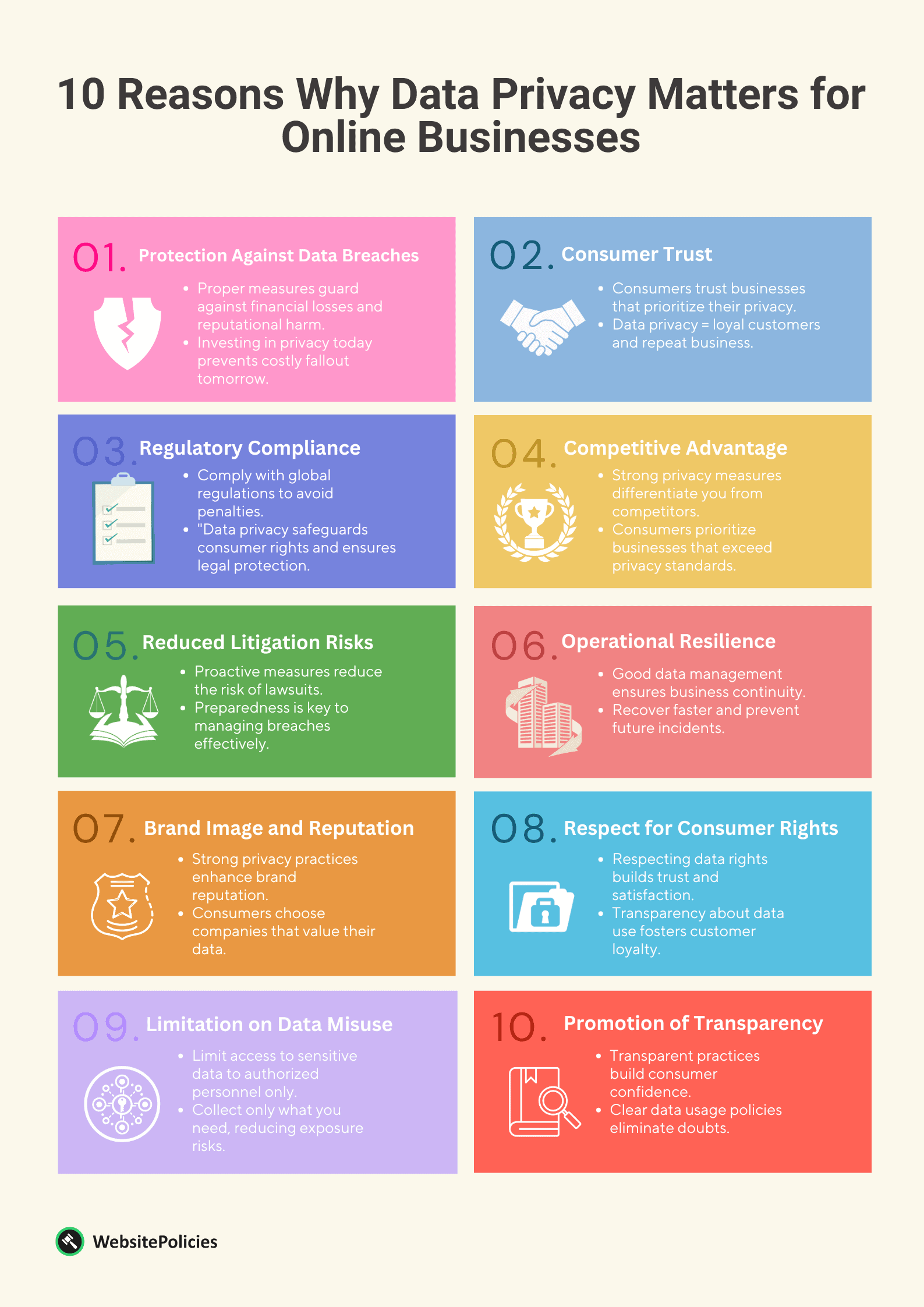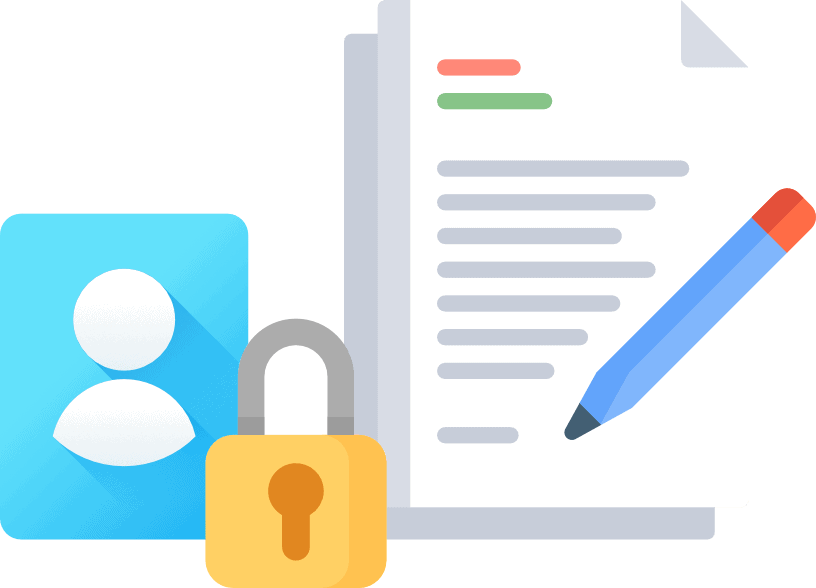Data privacy is the right that each individual has to ensure their personal information is securely managed and protected from misuse. It’s about how personal data should be responsibly gathered, processed, stored, shared, and eventually deleted or destroyed.
In this article, I’ll walk you through why data privacy is important and why you should make it a top priority. I’ll also provide you with practical tips to enhance your customers’ data privacy in your day-to-day operations.
Let’s jump into this important topic about keeping your and your users’ information safe.
- Data privacy is foundational for online businesses, impacting consumer trust, legal compliance, competitive advantage, and brand reputation.
- Data breaches can lead to severe consequences, from legal troubles to damaged brand trust and financial losses.
- Enhancing data privacy involves measures like strong encryption, software updates, restricting data access, regular employee training, and updating privacy policies.
Table of Contents
PRO TIP: Take the hassle of writing your own privacy policy away with our privacy policy generator trusted by over 200,000 businesses. It’ll save you hours of work and possible costly legal mistakes.
Why Is Data Privacy Important?
Data privacy is essential because it safeguards personal information from unauthorized access, abuse, and improper handling. Here are some reasons why data privacy should never be taken lightly:

Protection Against Data Breaches
Proper data privacy measures help protect you from cyber threats and data breaches that can lead to financial losses and reputation damage. It’s the difference between staying safe in the virtual world and falling prey to data breaches.
Why are they so serious? Simply put, they can lead to substantial financial losses. Imagine the expenses associated with addressing a breach, compensating affected customers, or even facing legal action.
Not to mention, you’ll likely have to invest more in your security infrastructure afterward to prevent such incidents in the future.
But, it’s the reputational damage that can be even more devastating. Once your customers find out their data has been compromised, they might turn their back on you. This is a situation you want to avoid at all costs.
Winning a customer’s trust takes time and effort, but losing it can happen in the blink of an eye.
Consumer Trust
Customers are more likely to trust and engage with businesses that prioritize their data privacy. This trust is fundamental to building long-term customer relationships.
When you prioritize data privacy, you’re essentially telling your customers, “I respect your personal information and take steps to protect it”.
From my own experience as a consumer, I feel much more confident doing business with an entity that highlights its data privacy measures.
It gives me a sense of safety, a comfort knowing that my private information, such as my social security number, is in good hands. I’m sure you can relate to this.
And as a business owner, trust is a powerful tool. It is essential to build long-term relationships with your customers.
In my eyes, it’s a win-win situation — your customers feel valued and protected, and you get to enjoy their loyalty and repeat business. Now, isn’t that a worthwhile investment?
PRO TIP: When your customers trust you, they are more likely to stick with you, come back for more, and even recommend you to others.
Regulatory Compliance
Numerous data privacy laws and regulations worldwide mandate the protection of customer data. Ensuring data privacy helps you avoid legal penalties and sanctions.
From the General Data Protection Regulation (GDPR) in Europe to the California Consumer Privacy Act (CCPA), these data protection laws aren’t just recommendations but are mandatory. They don’t exist to make life difficult; they’re there to protect consumer rights in a digital age.
You might be thinking, “What does this mean for my business?” It’s simple. Ensuring data privacy protects your customers and your business from potential legal fallout.
Non-compliance doesn’t just damage your reputation, but it can also lead to heavy penalties and sanctions. I’ve seen businesses suffer from fines that could have been avoided it’s not a situation you want to find yourself in.
PRO TIP: The importance of data privacy and data security and proper implementation of these measures helps you stay on the right side of the law.
Competitive Advantage
In the business world, standing out from the competition is a constant challenge. However, businesses that demonstrate strong data privacy and security measures can differentiate themselves well from competitors, which can be a unique selling proposition.
Are you wondering how that works? Consumers are more aware and concerned about how their personal information, particularly sensitive personal data like financial data, is being used.
If you show that you’re not just meeting the minimum data privacy standards, but exceeding them, you are directly addressing these concerns. It’s like saying, “I value your privacy, and I’m taking these extra steps to protect it”.
This commitment to maintain and comply with data privacy laws sets you apart in a crowded market and could be the deciding factor for consumers choosing between you and your competitor.
PRO TIP: Investing in strong data privacy measures is a strategic move that could propel your business to new heights.
Reduced Litigation Risks
If a breach occurs, businesses that have taken adequate steps to protect user data are less likely to face lawsuits.
No business is completely immune to data breaches. They can happen to anyone, at any time, no matter how much you try to protect the privacy of your customers. But what makes a world of difference is how prepared you are and the steps you’ve taken to protect user data.
What difference does it make? Well, a significant one. If a personal data breach does occur, and you’ve taken ample measures to safeguard user’s private data, you’re less likely to find yourself on the receiving end of a lawsuit.
Companies get dragged to court over data breaches all the time. And it’s a costly, time-consuming process that can do serious harm to your reputation.
Having safe data storage, privacy and protection measures and a data breach response plan are the kinds of proactive strategies that pay off in the long run.
Operational Resilience
A focus on data privacy generally goes hand-in-hand with good data management practices. What’s more, sound data management not only ensures the privacy and protection of user information but also makes your business operations more robust and resilient.
Imagine if a cyber-attack or system failure were to occur. With effective data management, your business could withstand, recover from, or even prevent these kinds of situations faster and more efficiently. That is the essence of operational resilience.
Brand Image and Reputation
Taking data privacy seriously shows that a company values its customers, thereby enhancing its brand image and reputation.
Nothing speaks louder about a company’s values than the way it handles data privacy. When you prioritize data privacy, you’re making a clear statement that you value your customers and their personal information.
This message resonates with them and goes a long way in shaping their perception of your brand. There’s no faster way to enhance your brand image and reputation than this.
Now, think about a potential customer choosing between you and a competitor. If they see that you’re going above and beyond in protecting their data, who do you think they’ll choose?
It happens time and again — businesses that invest in data privacy enjoy a more solid reputation and a stronger bond of trust with their customers.
PRO TIP: Data privacy is an investment in your brand’s image and reputation and in today’s competitive business landscape, a positive reputation is worth its weight.
Respect for Consumer Rights
In many regions, consumers have the right to know how their data is being used. Respecting these rights is not only ethical but can also boost customer satisfaction and loyalty.
By respecting consumer data rights, you’re not just meeting a legal requirement or acting ethically, although both are vital. You’re also building trust and satisfaction among your customers. When consumers see their rights being respected, they feel valued and understood.
Think about a customer deciding whether to continue business with you or look elsewhere. If they see you transparently respecting their data rights, they’re much more likely to stay. Many businesses thrive on loyalty born out of trust and respect.
Limitation on Data Misuse
Effective data privacy measures limit the potential for data misuse, both internally and externally.
With stringent data privacy measures, you’re essentially stopping the irresponsible handling of individual’s personal data, both within and outside your organization. It’s about setting up strict access controls and protocols that protect data from unauthorized access.
Consider the consequences if such measures are not in place. Internally, sensitive data could be mishandled or misused, leading to a multitude of issues. Externally, the risk of data breaches, where malicious actors access and exploit your data, increases greatly.
If a business collects more data from users than it needs, it opens itself up to unnecessary risks. Stop collecting data you don’t need to avoid this scenario.
Promotion of Transparency
Data privacy procedures require companies to be transparent about how they collect, use, and store customer data, creating an environment of trust and openness.
But how does a data privacy procedure lead to transparency? When you implement data privacy procedures, you’re compelled to be clear and open about how you collect data, as well as how you use and store it.
In essence, you’re letting your customers in on the process, removing any shroud of secrecy. This openness can be quite powerful in a positive way.
Examples of Data Privacy Violations and Penalties
Without a doubt, there have been some high-profile cases of data privacy violations that serve as important reminders of the need for secure data privacy practices.
In 2019, we saw an unprecedented event where Facebook was slapped with a $5 billion fine by the Federal Trade Commission. The cause? A serious violation of users’ privacy.
This serves as a stern reminder that no company is too big to fall foul of privacy regulations. It’s a clear signal that respecting users’ privacy isn’t just an ethical choice, but a legal obligation.
Uber’s case in 2018 is another eye-opening example. The company was fined $148 million for covering up a data breach that exposed the personal information of approximately 57 million users and drivers.
This case shows that it’s not just the breach itself that can land you in trouble; attempting to hide it can lead to harsh penalties too. This highlights the importance of transparency and prompt action in the face of a data breach.
These examples underscore the point that data privacy needs to be taken seriously. The consequences for failing to do so can be severe, not just in terms of penalties, but also in damage to reputation and user trust.
Tips for Improving the Data Privacy for Your Business
Data privacy should be a top priority for any business, and frankly, there’s no time like the present to start improving yours.
Whether you’re starting from scratch or looking to enhance your current procedures, here are some tips that can help guide you through this process.
Establish a Culture of Privacy
A culture that values privacy is the backbone of a strong data privacy strategy. It’s not just about meeting the legal requirements — it’s about infusing every aspect of your business with a respect for privacy.
Train your staff regularly on privacy principles, ensure they understand the importance, and recognize their role in maintaining it. When privacy becomes a part of your company culture, protecting it becomes second nature.
Adopt a Privacy-By-Design Approach
A privacy-by-design approach is something I can’t recommend highly enough. This means considering privacy at the initial stage of any project, product, or process.
It’s similar to building a house with a reliable security system in place, rather than trying to install one after the house is already built. It’s more effective, and it’ll save you a bunch of headaches down the line.
Regularly Audit and Update Your Privacy Policies
It’s important to see your data privacy policy as a living document. Regularly audit and update it to ensure it stays relevant and complies with ongoing changes in privacy laws and business practices.
Make it a point to communicate these updates to your customers promptly. Remember, transparency is key.
ALSO READ: Customizable Privacy Policy Template
Implement Strong Security Measures
Last, but definitely not least, there’s no substitute for strong security measures. Encrypt sensitive data, use strong passwords, regularly update your systems, and consider using a reliable security framework.
These steps can keep your data safe and secure, offering your customers that much-needed peace of mind.
PRO TIP: Integrating privacy into the design or conception phase of any project or business is a game-changer because it allows you to anticipate and address potential privacy issues right from the start.
Frequently Asked Questions
Why is data privacy important for online businesses?
Data privacy builds customer trust, ensures legal compliance, offers a competitive advantage, reduces litigation risks, and enhances brand reputation.
How can data breaches impact a business?
Data breaches can lead to unauthorized data access, damaged brand reputation, lost customer trust, legal troubles, and financial penalties.
What role does consumer trust play in online business?
Trust influences buying decisions. When consumers believe a company respects their privacy, they’re more likely to become loyal customers and recommend the brand.
How do regulations impact data privacy practices?
Regulations set standards for data protection. Non-compliance can result in hefty fines, legal actions, and a tarnished public image.
How can data privacy provide a competitive advantage?
By prioritizing data privacy, businesses can gain consumer trust, leading to higher engagement, increased conversions, brand loyalty, and innovative opportunities.
How can businesses enhance their data privacy measures?
Measures include using strong encryption, updating software, restricting data access, training employees, and frequently reviewing privacy policies.



